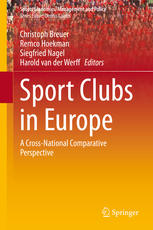

Most ebook files are in PDF format, so you can easily read them using various software such as Foxit Reader or directly on the Google Chrome browser.
Some ebook files are released by publishers in other formats such as .awz, .mobi, .epub, .fb2, etc. You may need to install specific software to read these formats on mobile/PC, such as Calibre.
Please read the tutorial at this link: https://ebookbell.com/faq
We offer FREE conversion to the popular formats you request; however, this may take some time. Therefore, right after payment, please email us, and we will try to provide the service as quickly as possible.
For some exceptional file formats or broken links (if any), please refrain from opening any disputes. Instead, email us first, and we will try to assist within a maximum of 6 hours.
EbookBell Team

4.1
80 reviewsThis book presents an up-to-date portrait of the characteristics of sport clubs in various European countries and their role in society and the national sport system. Furthermore, it offers a cross-national comparative perspective of sport clubs in twenty European countries. Containing both empirical data and information on the political and historical backgrounds of sport clubs, the book is organized in three parts. First, the authors provide an overview of the theoretical approach of the book and a description of the framework used for the country chapters. Second, the country chapters, written by experts within the field, provide a systematic overview of the available information on sport clubs in each country. These chapters are structured to answer the following questions: (1) What is the position of sport clubs within the national sport structure? (2) Which role do they fulfil in policy and society? (3) What are their basic characteristics and what factors influence the development of sport clubs? The book is concluded with a systematic comparison of the participating countries with the purpose of forging a clear link between the functioning of policy systems, observed problems, and possible solutions, and with a future research agenda on sport clubs. In an era of increased collaboration between European states, sport provides a natural vehicle through which to compare changes in culture, economics, and policy across nations. Sport Clubs in Europe will appeal to scholars of nonprofit management, sports management and sports sociology as well as administrators and policy makers in the international sports community.